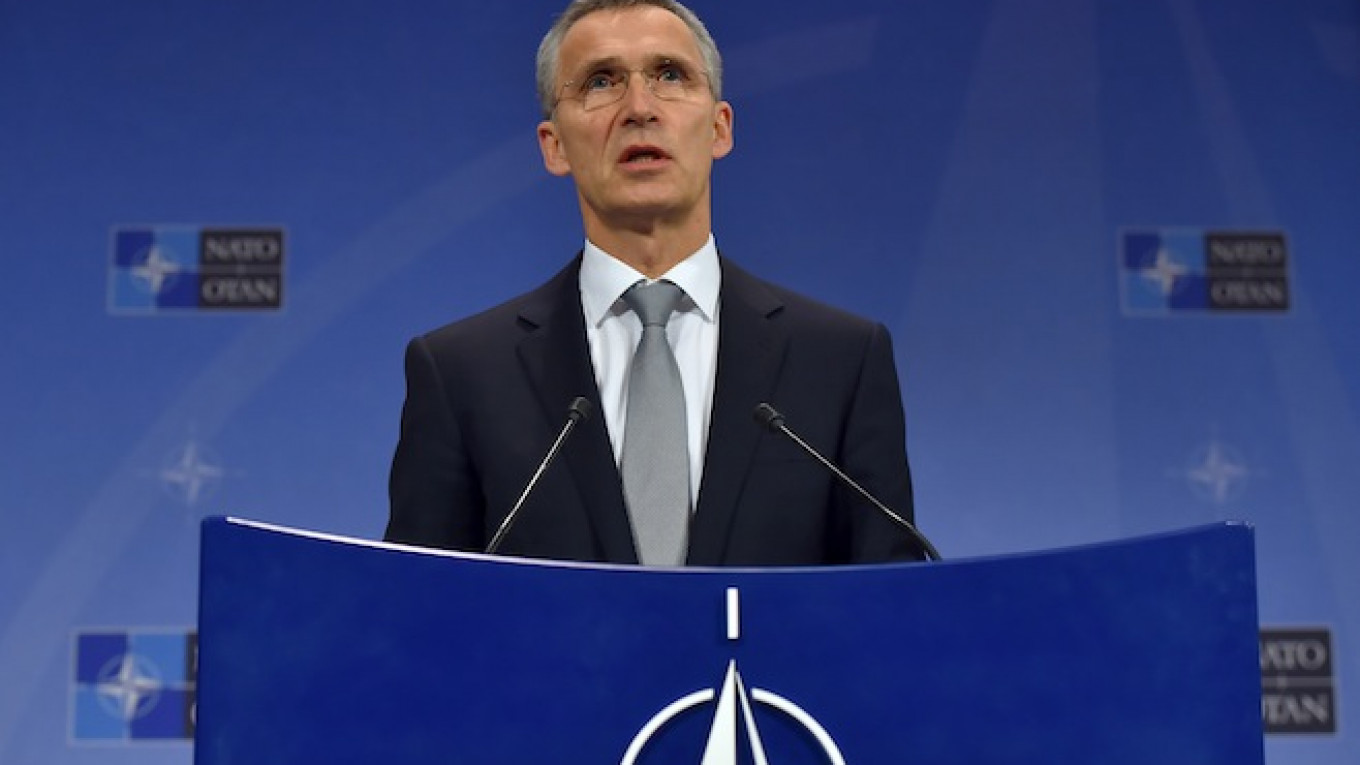It was meant to be about easing tensions, two years after Russia ruptured relations with NATO by annexing Crimea.
But the atmosphere in the run up to an April 20 meeting of the Russia-NATO ambassadors' council, the first to be held since that rupture, has been poisonous.
Eastern European leaders have lined up to urge firmness against the Russian threat. Poland's foreign minister, Witold Waszczykowski, called Moscow a more potent risk than Islamic State*. From the opposite side, Russian officials have ranted at the perceived arrogance and "zealous Russophobia" of NATO leaders.
The most vivid display of tension occurred over the Baltic Sea, where simulated attack runs on April 11 brought a Russian Sukhoi Su-24 attack aircraft to within 10 meters of a U.S. destroyer, the Donald Cook, that was sailing in international waters. Soon afterward, a Russian fighter intercepted and performed a daring barrel-roll over a U.S. reconnaissance plane in the region.
There's "a total lack of trust" between Russia and NATO, Kremlin spokesman Dmitry Peskov told reporters on Tuesday. Both sides accuse the other of military buildups on their borders and aggressive propaganda.
The NATO-Russia Council, a format invented in 2002, is meant to address that, along with Ukraine, where Russia-backed separatists are still fighting a low-key war, and Afghanistan. "What we want is constructive, civilized conversation," Robert Pszczel, the acting head of NATO's information office and veteran of the alliance's representative office in Moscow, told The Moscow Times.
Jens Stoltenberg, the NATO secretary-general, on Tuesday called Russia's aerial acrobatics "unprofessional and unsafe," and said they "underline the importance of open military lines of communication, predictability and risk reduction," according to the Wall Street Journal.
While real diplomatic warmth may be off the agenda, NATO says it wants to focus the council meeting on "risk reduction" — so that the next Russian warplane doesn't accidentally clip a wing, kill a pilot and pitch a nuclear-armed Russia and the most powerful militarily alliance in history into crisis.
But agreement is unlikely, says Vladimir Frolov, a Russian analyst. "Moscow views its provocative and unpredictable actions and its willingness to risk much more serious incidents than the West as a 'force equalizer' — a non-linear response to the West's military superiority," he says.
Meanwhile, the Baltic region is tenser than at any time since the Cold War. In the two years of the Ukraine crisis, Russia's Baltic exclave of Kaliningrad has been fortified and increasingly economically isolated. Anxiety is rising in Baltic nations, fanned by politicians and the press. NATO has reinforced units there.
Latvia is building a wall on its border with Russia. Lithuania last year reintroduced conscription. A Latvian state commission announced this week that the Soviet "occupation" (which it said was as "criminal" as the Nazi one) cost the country 185 billion euros ($210 billion).
The antagonism is prompting some to call for dialogue. Not only has the NATO-Russia Council been resurrected, but Russia is no longer ignored at the world's major forums.
In a sign of engagement, Ukrainian President Petro Poroshenko on Tuesday hinted he had reached a deal with Russian President Vladimir Putin to release Ukrainian pilot Nadia Savchenko, subjected in Russia to a trial that was widely condemned.
However, "there is little prospect of any tangible progress" from the NATO-Russia meeting, says Frolov.
The real goal for Russia seems to be a public relations victory. On the one hand, NATO officials are firm that Russia will not be brought in from the cold. On another, says Frolov, the meeting — which Moscow says is only happening because NATO asked for it — allows Russia to demonstrate that the Western countries which have tried to isolate it are "seeing the error of their ways" and have come knocking at the Kremlin's door for reengagement.
*Islamic State is a terrorist organization banned in Russia.
Contact the author at p.hobson@imedia.ru or on twitter: @peterhobson15
A Message from The Moscow Times:
Dear readers,
We are facing unprecedented challenges. Russia's Prosecutor General's Office has designated The Moscow Times as an "undesirable" organization, criminalizing our work and putting our staff at risk of prosecution. This follows our earlier unjust labeling as a "foreign agent."
These actions are direct attempts to silence independent journalism in Russia. The authorities claim our work "discredits the decisions of the Russian leadership." We see things differently: we strive to provide accurate, unbiased reporting on Russia.
We, the journalists of The Moscow Times, refuse to be silenced. But to continue our work, we need your help.
Your support, no matter how small, makes a world of difference. If you can, please support us monthly starting from just $2. It's quick to set up, and every contribution makes a significant impact.
By supporting The Moscow Times, you're defending open, independent journalism in the face of repression. Thank you for standing with us.
Remind me later.






